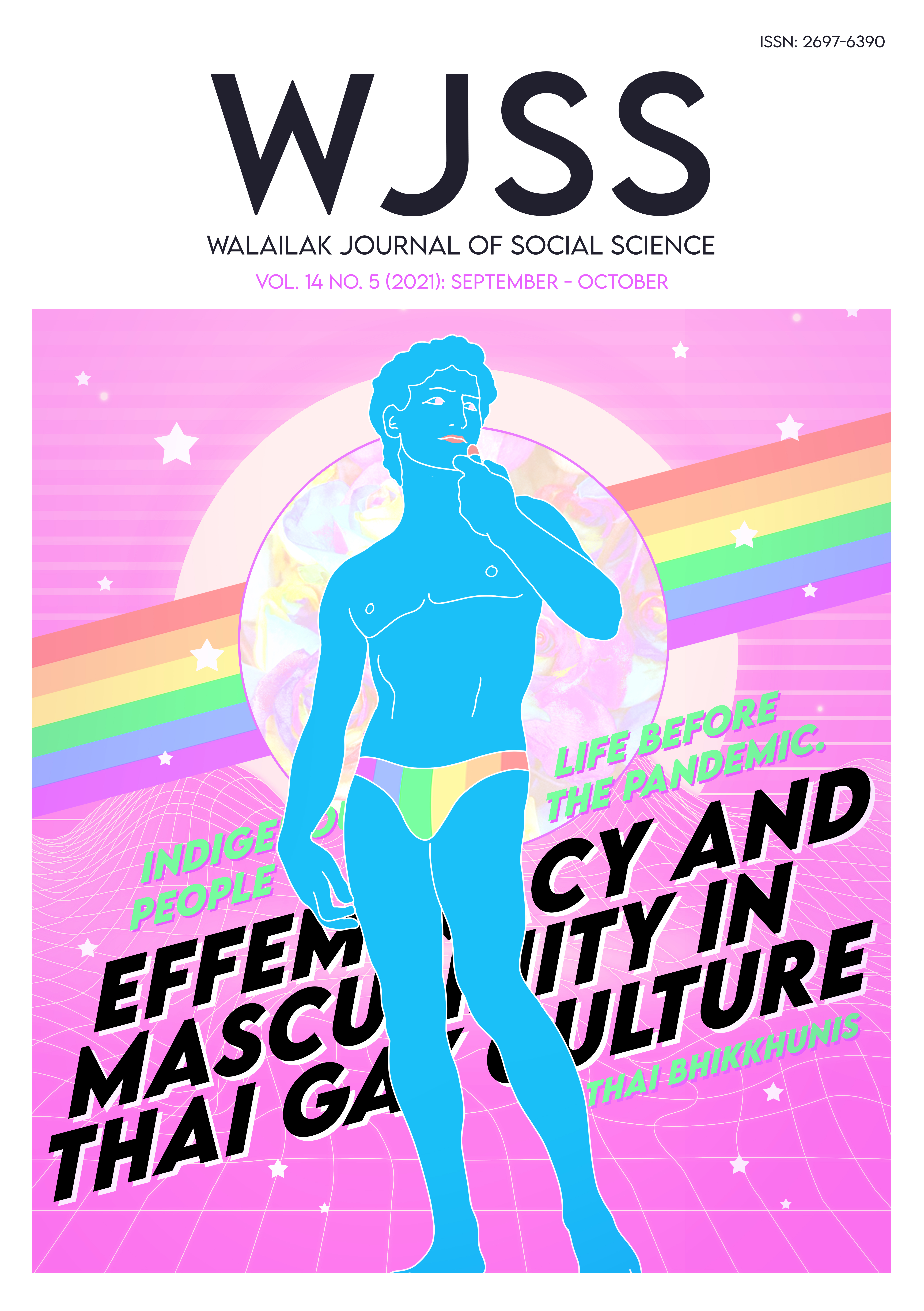The Integration of Manipulatives and Cooperative Learning in the Learning Measurement of Grade Four Bhutanese Students
Main Article Content
Abstract
The objectives of this study were to investigate the effectiveness of the integration of manipulatives and cooperative learning strategies on grade four Bhutanese students’ learning achievement in measurement and to explore their perceptions towards it. Quantitative data was gathered through pretest and posttest, and qualitative data was gathered through semi-structured interviews. The quantitative data was then analyzed using paired sample t-test and the qualitative data was analyzed using thematic analysis. The data analysis showed a significant improvement in students’ posttest scores compared to the pretest scores. The mean (x̅) difference (x̅ = 9.67) between posttest (x̅ = 16.67) and pretest (x̅ = 7.00) indicated that the use of manipulatives and cooperative learning strategies improved the learning achievement of students. Similarly, analysis of semi-structured interview data revealed that the students developed positive perceptions towards the use of manipulatives and cooperative learning strategies in learning mathematics. Therefore, the results of the pretest, posttest and semi-structured interviews demonstrated that the integration of manipulatives and cooperative learning strategies was effective in learning measurement for grade four Bhutanese students.
Article Details
Copyright: CC BY-NC-ND 4.0
References
Allen, C. (2017). An action based research study on how using manipulative will increase students’ achievement in mathematics. Michigan: Marygrove College.
Agujar, M. H. S. (2018). The effectiveness of using manipulatives in teaching liner equation (pp. 1-23). In Proceedings of 10th International Conference on Psychology and Language Research (Thailand). Pattaya, Thailand: Global Psychology and Language Research Association.
Bryan, E. R. (2017). Effectiveness of small group instruction with the use of manipulatives (Doctoral dissertation). Georgia: Brenau University.
Bhutan Council for School Examinations and Assessment. (2019). National education assessment. Thimphu, Bhutan.
Bruan, V., & Clarke, V. (2016). Thematics analysis. The Journal of Positive Psychology, 12(3), 297-298.
Caulfield. J. (2020). How to do thematic analysis. Retrieved from https://www.scribbr.com/methodology/thematic-analysis
Carbonneau, J. K., Wong, M. R., & Borysenko, N. (2020). The influence of perceptually rich manipulatives and collaboration on mathematic problem-solving and perseverance. Contemporary Educational Psychology, 61, 1-11.
Chakraborty, A. (2016). Why is measurement important in our day to day life? Retrieved from https://www.quora.com/Why-is-measurement-important-in-our-day-to-day-life
Dolma, P. (2016). Investigating Bhutanese mathematics teachers’ beliefs and practices in the context of curriculum reform (Doctoral dissertation). Australia: Queensland University of Technology.
Drukpa, P. (2015). Bhutanese student’s attitude towards mathematics: Findings from a cross-sectional survey of grade six students. Attitude towards Mathematics, 16(2), 37-52.
Farmer, L. M. (2017). Kagan cooperative learning structures and the effects on student achievement and engagement (Master’s thesis). Illinois: Northwestern College.
Griffiths, R., Back, J., & Gifford, S. (2017) Making numbers: Using manipulatives to teach arithmetic. Oxford: Oxford University Press.
Graham, J. (2013). Concrete math manipulatives in upper elementary mathematics classrooms (Doctoral dissertation). Minnesota: Walden University.
Gillies, M. R. (2016). Cooperative learning: Review of research and practice. Australian Journal of Teacher Education, 41(3), 39-54.
Hom, E. J. (2013). What is mathematics? Live science. Retrieved from https://www.livescience.com/38936-mathematics.html
Hossain, M. A., & Ariffin, M. R. K. (2018). Integration of structured cooperative learning in mathematics classrooms. International Journal of Psychology and Educational Studies, 5(1), 23-29.
Johnson, D. W., & Johnson, R. T. (2018) Cooperative learning: The foundation for active learning. Active Learning - Beyond the Future. Retrieved from https://www.intechopen.com/books/active-learning-beyond-the-future/cooperative-learning-the-foundation-for-active-learning
Karali, Y., & Aydemir, H. (2018). The effect of cooperative learning on the academic achievement and attitude of students in Mathematics class. Educational Research and Reviews, 13(21), 712-722.
Kane, L. (2018).Cooperative learning in math education (Master’s thesis). Illinois: Northwestern College.
Khadafi, M. (2017).Teaching narrative writing by using round table strategy to Islamic junior high school students. Jurnal Pendidikan dan Pengajaran, 4(2), 57-65.
Kagan, S., & Kagan, M. (2009). Kagan cooperative learning. San Clemente, CA: Kagan Publishing.
Kusmaryono, I. (2014). The importance of mathematical power in mathematics learning (pp. 35-40). In Proceedings of the International Conference on Mathematics, Science, and Education 2014. Indonesia: Semarang State University.
Lewis, B. (2019). What is cooperative learning - Teaching students to collaborate effectively? Retrieved from https://www.thoughtco.com/what-is-cooperative-learning-2081641
Larbi, E., & Mavis, O. (2016).The use of manipulatives mathematics education. Journal of Education and Practice, 7(36), 53-61.
Liggett, R. S. (2017). The impact of use of manipulatives on the math scores of grade 2 students. Brock Education Journal, 26(2), 87-110.
Munday, S. (2019). An investigation into what extent manipulatives influence the teaching of mastery mathematics based in a key stage two primary setting (Bachelor’s thesis). Wolverhampton: University of Wolverhampton.
Royal Education Council. (2016). National school curriculum conference. Rethinking Curriculum. Paro, Bhutan.
Setapa, M., Kanafiati, M., & Zaman, L. K. (2016). A study of students’ perception toward mathematic. Journal of Applied Environmental and Biological Sciences, 6(7S), 28-33.
Syam, A. P., Akib, I., & Syamsuddin, A. (2019). The application of cooperative learning model of Team Assisted Individualization (TAI) based manipulative media on topics “Shape” of class VI Elementary school of Tombolok Gowa. DAYA MATEMATIS: Jurnal Inovasi Pendidikan Matematika, 7(3), 317-327.
Sudihartinih, E. (2020). Using manipulatives in eth-cooperative learning to enhance mathematical learning outcomes. Erudio Journal of Educational Innovation, 7(1), 57-63.
Tshewang, R. (2015). Bhutanese eighth grade students’ and teachers’ perceptions of their classroom learning environment in relation to the mathematics curriculum (Doctoral dissertation). Australia: Queensland University of Technology.
Vang, M. (2017). Math gains in early elementary grades using traditional and Montessori math manipulatives (Master’s thesis). Wisconsin: University of Wisconsin.
Willingham, D. T. (2017). Ask the cognitive scientist: Do manipulatives help students learn? American Educator, 41(3), 26-40.


